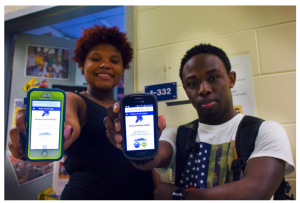
Boston Student Advisory Council president Glorya Wornum, left, and BSAC member Ayomide Olumuyiwa show off the Boston Student Rights app in the hallway of Madison Park Technical Vocational High School. (Peter Balonon-Rosen/WBUR)
A group of Boston Public School students recently launched the website and mobile phone app Boston Student Rights. The app is intended to inform students of their rights and responsibilities as students in the Boston School System.
The app provides the district’s student population with the code of conduct in a condensed, simplified format. Information contained in the app includes subjects ranging from types of suspensions to cellphone policies, LGBTQ students’ rights, teacher evaluations and dress codes.
The app was created with the help of Ayomide “Ayo” Olumuyiwa, a senior at John D. O’Bryant High School in Boston. “You can’t defend yourself anywhere if you don’t know the type of rights that you have,” says Olumiyiwa.
According to Olumiyiwa the app provides information on proper school discipline processes and emphasizes the student’s rights and responsibilities according to state law and provides listings of legal aid resources available to students.
Olumuyiwa hopes that by educating fellow students of their rights the app can help disrupt a legacy of harsh disciplinary practices in urban schools. Harsh discipline could potentially push students out of the classroom into a process known as the school-to-prison pipeline.
Research indicates that black students in Massachusetts schools are almost four times more likely than whites and Latino students are 3 times more likely than white students to be suspended often for minor offenses.
Two federal agencies, the Justice and Education Departments, are now urging the nation’s school districts to dial back zero tolerance policies that often result in harsh punishments for seemingly minor offenses. Congress and student advocates feel these policies are the beginning of the “school-to-prison pipeline.” “A routine school disciplinary infraction should land a student in the principal’s office, not in a police precinct,” former Attorney General Eric Holder said in a statement.
“In our investigations, we have found cases where African-American students were disciplined more harshly and more frequently because of their race than similarly situated white students,” the Justice and Education Departments wrote in a recent letter to the nation’s school districts. “In short, racial discrimination in school discipline is a real problem.”
Olumuyiwa acknowledges her generation loves their smartphones. “We chose an app because we’re the generation of phones,” says Olumuyiwa. “Like, we all have our phones for everything, so an app is just one click away.”
The Boston Student Advisory Council, of which Olumuyiwa is a member, is the group that created the app. BSAC is made up of elected student activists working to address student identified issues in the district and across the city. BSAC promotes fair school discipline practices. They decided this year that by educating students about their own rights this would hold school staff accountable to honoring those rights. From this thought, came the idea for the app.
“The school-to-prison pipeline, student rights and responsibilities, suspensions, expulsions, legal aid resources, alternative discipline and restorative justice,” says Glorya Wornum, BSAC president and a senior at Edward M. Kennedy Academy in Boston. “And you’re able to click on any one of those tabs and it’ll open you up to another page. And once you’re in another page you’re able to scroll up or down to read on information that could help you.”
The app will soon be available for Apple and Android or can be viewed on the Boston Students Rights website.
Now you know
